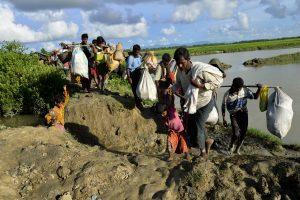A United Nations expert has called for Southeast Asian governments to launch a regional emergency response to address a surge of Rohingya refugees arriving in Indonesia by sea.
More than 1,000 Rohingya civilians have landed in Aceh in western Indonesia over the past 10 days, after perilous ocean journeys from the coast of southeastern Bangladesh. The most recent of these came late on Tuesday, when a boat arrived carrying more than 200 people.
In a statement yesterday, Tom Andrews, the U.N. Special Rapporteur on the situation of human rights in Myanmar, said that nations in the region should collaborate to ensure coordinated search and rescue operations to save the lives of those who may be stranded on overcrowded, unseaworthy vessels.
“The Government of Indonesia should be congratulated for again upholding the rights of the Rohingya and facilitating disembarkation in line with domestic law,” Andrews said in the statement. “But they cannot do it alone. This is an emergency, and an emergency response is required.”
Rohingya refugees and asylum seekers have been seeking sanctuary by sea for years, seeking to escape both severe persecution in Myanmar and the hardships of life in the Bangladeshi refugee camps. Very often this involves putting their lives in the hands of human smugglers who send them on journeys through the Andaman Sea on leaky and dangerously ill-equipped vessels.
The number of Rohingya undertaking boat journeys jumped significantly last year, and based on the rash of recent arrivals in Aceh, appears set to do so again in 2023. According to the U.N. refugee agency UNHCR, 3,572 Rohingya refugees have set off by sea from Bangladesh and Myanmar this year, compared to 1,947 Rohingya refugees during the same period in 2022. Given that the “calm” season, which runs from November to April, has only just begun, it is likely that many more boats will disembark before the year is out.
The surge of arrivals reflects the deteriorating conditions in the refugee camps of southeastern Bangladesh, where around a million mostly Rohingya men, women, and children have languished for years. Most arrived there in August and September of 2017, when the Myanmar military drove more than 700,000 Rohingya civilians from Rakhine State into Bangladesh, in a campaign that a U.N. fact-finding panel claims was marked by “genocidal intent.”
The camps are “squalid and overcrowded,” according to the aid group Save the Children, with few job opportunities, waning tolerance from the Bangladeshi authorities and the local population, and rampant crime.
There is also a vanishingly small chance that civilians will be able to return to their old villages in Rakhine State any time soon, given the turmoil that has engulfed Myanmar since the military coup of 2021. The civil war in Myanmar, combined with other global crises in places like Ukraine and Gaza, has also distracted international attention from the Rohingya refugee crisis. The waning international attention has led to shortfalls in international funding to the refugee camps, and consequent cuts in food rations.
As Andrews said in his statement, refugees’ desire to flee the camps is entirely understandable. “Parents have reached a breaking point as their children suffer from hunger and malnutrition and face the threat of increasing violence in the camps,” he said. “These families are not boarding overcrowded vessels because they want to, they are doing so because they are desperate and see no choice.”
It is hard to be optimistic about the situation, given that around this time last year, rights groups made similar appeals to regional governments for concerted action to deal with a surge of Rohingya boat voyages.
At the same time, it is clearly unsustainable that the burden of hosting and caring for Rohingya refugees is simply transferred from Bangladesh to Indonesia. While devoutly Muslim Acehnese villagers have historically been accommodating to refugees arriving from Myanmar and Bangladesh, the sudden glut of arrivals is straining local tolerance and prompting prickly responses from the Indonesian government.
In his statement, Andrews argued that it was only by addressing the root cause of the crisis that the boat voyages, and their high human toll, could be avoided. “A resolution of the Rohingya refugee crisis is not possible so long as the junta prevents the formation of a government committed to human rights and citizenship for the Rohingya,” he said.
While the military junta is facing reversals on a number of fronts, anything approaching a holistic solution to the Rohingya refugee crisis still appears many years off.

































